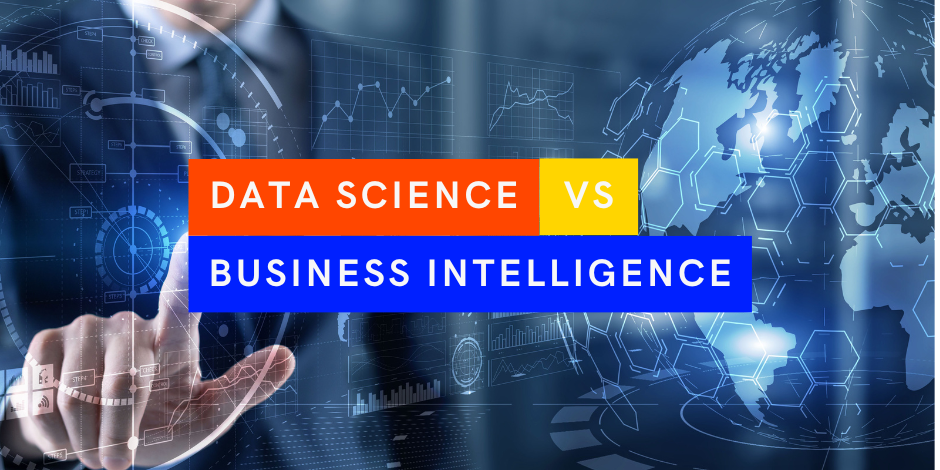Data Science vs Business Intelligence: The Ultimate Guide

Stay Informed With Our Weekly Newsletter
Receive crucial updates on the ever-evolving landscape of technology and innovation.
Data science vs business intelligence: the differences often need to be clarified. The confusion stems from the interrelation of their purpose. Both careers focus on condensing information into more valuable forms to benefit a company or employer. The differences are only apparent in the individual methods unique to each profession.
Business intelligence depends on constantly improving technology, enabling senior managers and executive officers to decide the most appropriate course of action for an organisation. On the other hand, data science involves collecting, analysing and utilising different types of data to identify patterns and trends influencing decision-making.
Whether you are a professional with prior experience in either field looking to upskill or a first-timer in the industry, the following sections will highlight the similarities, differences and roles in each field.
What is data science best used for?

Data science is best used for optimising an organisation’s business operations by preparing reports and predicting trends after collecting data from all available and related sources. In addition, with data science, a business can tailor its consumer services by offering personalised content.
Data science can provide a far more personalised and enjoyable user experience, increasing customer loyalty. An example would be YouTube recommendations that work on an algorithm that reads into the user’s watch history and preferences, singling out content the person would most likely view. Sites like Netflix and Hulu rely on the same process, employing data science to provide personalised recommendations to users.
Base skills required for working in data science
To establish a successful career in data science, you must be skilled in multiple computer programming languages, mathematics and web scraping. Additionally, being an able problem solver with competence in data analysis and visualisation is also helpful.
- Experience in programming languages: Positions in this field require extensive knowledge of several programming languages, including Scala, Java and Python. To study the collected data and gather it accurately in the first place, you need to hold command over these languages and also machine learning. This mastery will enable you to create algorithms, edit data and produce successful insights into the business operation.
- A problem-solving disposition: Handling complex situations in the workplace and providing practical solutions on the spot is another main requirement in data science. Therefore, a candidate must be able to think creatively around barriers in the presented concepts and devise ways to fix any issue by manipulating the given data into a resolved structure.
- Expertise in data visualisation and analysis: Having the skills to assess unstructured data, give it an appropriate structure and present it in an understandable visual format is a fundamental ability. The pictorial form representing the collected data allows for straightforward explanations to untrained company members. Industry-proven tools like Power BI and Tableau can help with data extraction and analysis and present a finished visualisation.
- Expertise in Web Scraping: Web scraping is best defined as extracting any valid data anywhere on the internet that can prove valuable to the company’s operation, and in-depth knowledge of this technique is required of data science candidates. The field revolves around gathering, simulating and presenting data from any valuable source, making this requirement fundamental. Examples of web scraping over the internet include information assessed from surveys, reviews and polls among customers.
- Proficiency in Mathematics and Statistics: Anyone working with data science must perform excellently in statistics and mathematics to subsequently excel in creating algorithms. Before you upskill, you must hone your skills in both subjects, specifically probability distribution, calculus, linear algebra, regression and vector models.
Career options in data science
Once you have mastered the fundamental skills to thrive in data science, you will have several career options to choose from. These include being a data analyst, data scientist and data engineer. You can skim job posts for specific positions, but consider applying for multiple positions for a greater chance of success.
- Data analyst: This role involves using extensive tools and methods, including data visualisation, statistical analysis and SQL, to handle and structure collected data. Other responsibilities include assembling relevant big data and then evaluating and reorganising it to suggest patterns that could provide valuable insights.
- Data scientist: Being well-versed in programming languages and their respective syntax is a core responsibility for this position since they are vital to constructing model algorithms that are eventually transformed into finished applications. It is essential to exercise good interpersonal skills because this role also requires coming together with a team to assess data and predict future trends/bugs.
- Data Engineer: This position’s workload revolves around structuring otherwise inaccessible data and making it presentable so that other members of the workplace, such as business analysts, can use it. The responsibility of creating data infrastructure that can be easily accessed also falls on Data Engineers; this includes management and stimulation of cohesive data.
What is business intelligence best used for?

Business intelligence is best used for collecting and presenting otherwise unstructured information into a presentable form so organisations can identify patterns and make more informed decisions regarding their operation.
Business intelligence, also known as BI, uses modern technology to structure data from various sources, which might be too difficult to compile, relying solely on manual methods. After that, the information is presented to the relevant executives and managers in a user-friendly format so that they can understand the market trends and make more accurate predictions.
BI has gained prominence due to its ability to present a comprehensive overview of valuable information. This ability allows organisations to explore areas where improvement is required and gives way to a more efficient pace in the company.
Base skills required for working in business intelligence
Before pursuing a career in BI, you must ensure you are equipped with core skills, including reporting and interpersonal communication skills. It is also crucial for a candidate to have excellent analytical and critical thinking abilities and expertise in data assessment.
- Critical and analytical thinking skills: Being able to find rational and creative solutions while being open-minded constantly to the present problems is fundamental for working in BI, thus the emphasis on thinking skills, both analytical and critical.
- Reporting expertise: Positions in BI involve plenty of reporting to present insights from the data warehouse. Reporting skills are a must-have for any aspirant and ensure a concise presentation of the gathered data to be used efficiently.
- Excellent communication skills: Individuals in the field of BI need to constantly communicate the relevant findings and insights to higher management, which makes communication a precious asset in the field. It is also vital to discuss and interpret the results with team members.
- Proficiency in data analysis: Last but not least, professionals in the BI field need to be able to collaborate with different departments in the organisation to work on insights and improve data analysis. They also need to be proficient enough in data analysis to work independently.
Career options in business intelligence
Once you have mastered the base skills required for securing a position in BI, you will be able to delve further into available roles, which include political scientists, management analysts and financial analysts, among other positions.
- Financial Analyst: This position requires involvement with individuals and private organisations to assist them in choosing the most advantageous financial investment options. Using business analytics and market trends, financial analysts recommend alternatives for investment and maintain frequent updates presented in the form of reports.
- Political Scientist: The role of a political scientist centres around interpreting trends and collective sentiments, among the general population, toward policies and political candidates. This allows politicians to adapt and respond to controversy in the most optimal way possible.
- Management Analyst: The role of a management analyst includes making sound recommendations for improving business activity by collaborating closely with senior managers. Problem-solving and thinking skills play a significant role in this position. A management analyst needs to find the most effective methods of improving efficiency in the corporate workplace and keeping a constant eye on staff behaviour patterns.
How can you choose between the two career paths?
You can choose between data science and business intelligence career paths by considering your hands-on experience and prior subjects. However, it is essential to note that both routes are interrelated in using data to improve business operations.
Data science deals with methods such as web scraping to gather and stimulate data to make valuable insights into future business patterns. BI is involved with the evolving technology of taking data from all available sources, including third-party sites and forums and making it presentable for the senior managers.
This can help the managers to make sound decisions for the benefit of the business. While BI and data science are quite different in their specific procedure, their core goal of structuring and presenting data come to the same end.
If you’re considering a career in this field, consider one of our data science programs and get your new career underway!





